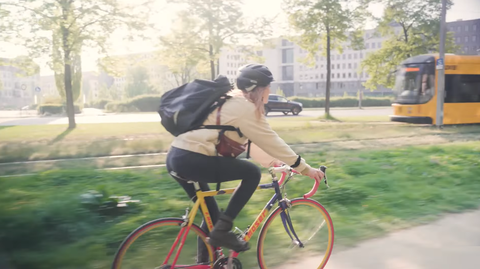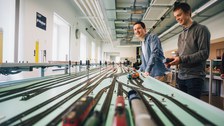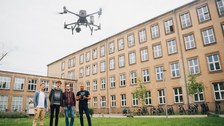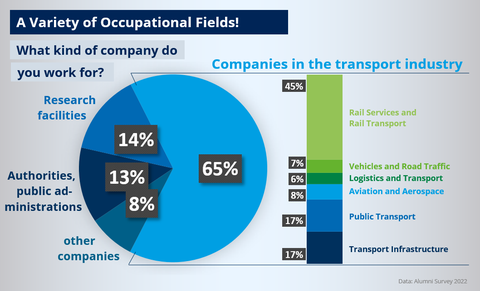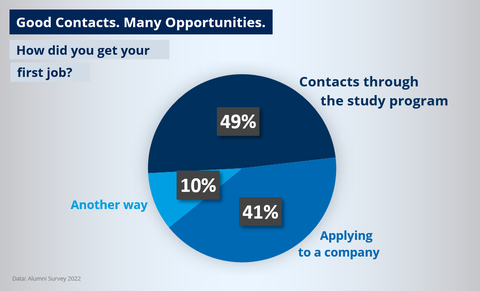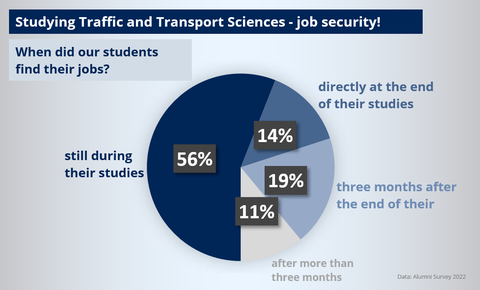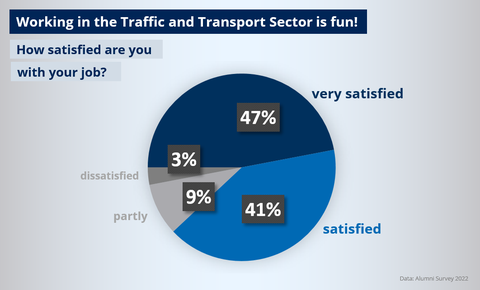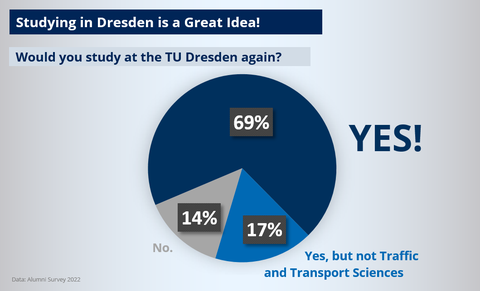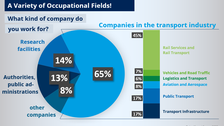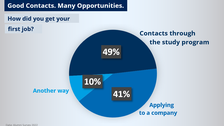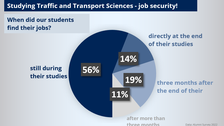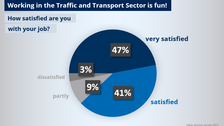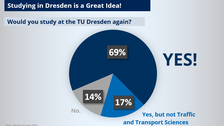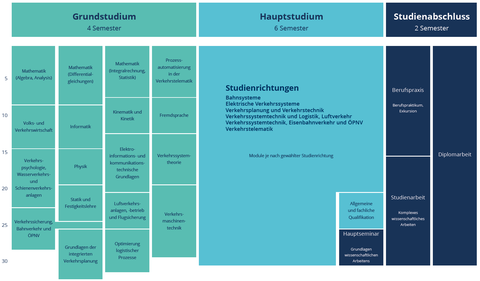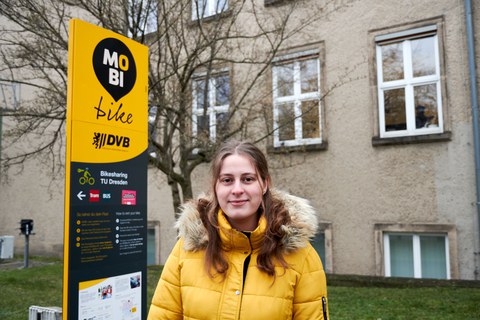Transport Engineering (Diplom)
Mobility and transportation are of great significance today and in the future. All people expect affordable mobility and properly functioning transportation systems. Mobility and transportation are fundamental components of society, indispensable for commerce and the economy, annoying for some, interesting for others - and systemically relevant for all.
Digitalization, automation, and climate protection pose major challenges for the transportation sector. In order to be able to plan, measure, and design complex, interconnected, and innovative transportation systems against this backdrop, the degree program provides all the necessary engineering knowledge. In addition, you learn how the individual disciplines of traffic and transportation science interact with one another and are shaped and influenced by neighboring disciplines such as computer science, electrical engineering, civil engineering, mechanical engineering, and economics.
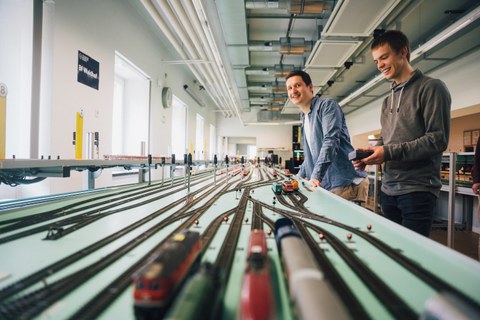
© Benjamin Jenak, TUD
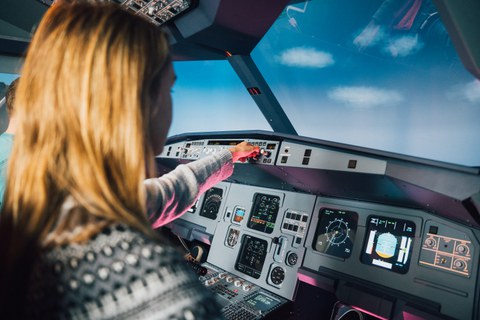
© Benjamin Jenak, TUD
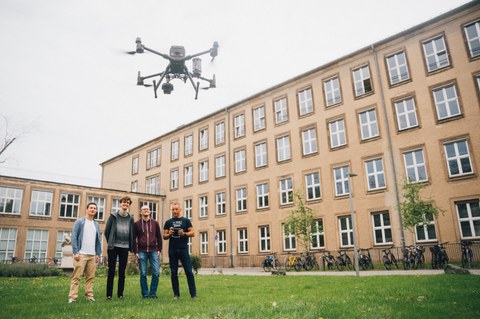
© Benjamin Jenak, TUD
| Degree | Diplom-Ingenieur*in (Dipl.-Ing.) |
| Standard period of study for full-time studies | 10 semesters |
| Primary teaching language | German |
| Part-time studies | Possible (50 %) |
| Numerus clausus | No numerus clausus |
| Start of study | Winter semester (October 1st) |
| Application period | June 1st - September 15th *April 1st - July 15th for international applications |
Studying Traffic and Transportation Science means job security! 70 percent of our students have their first permanent job while still studying or directly at the end of their studies. Almost all of our graduates enter attractive career paths after three months of job search at the latest. Career planning and orientation is a top priority for us even during our studies - with an annual in-house carreer fair, job portal, alumni association, and much more.
Possible occupational fields:
- Transportation departments at government authorities on municipal, state, and federal level
- Institutions with assignments in planning and operating road, rail, and water transportation facilities
- Public transportation companies
- Railroad industry and companies
- Air transportation companies
- Conveyance and trading companies, freight distribution centers
- Planning, consulting, and design companies working in the fields of transportation, communications, and logistics
- Research institutes in the fields of transportation, urban and regional planning, and environmental protection
- University research and teaching
The course begins with general engineering fundamentals such as mathematics, physics, engineering mechanics and computer science. At the same time, you learn about road, rail and air transportation systems in introductory courses. Transport Economics, Logistics, a foreign language, Transport Psychology and Transport Ecology round off the first four semesters.
Once you have acquired a broad knowledge of transport and mobility, you can choose a field of study, which you can deepen from the fifth semester onwards:
- 🚅 Railway systems
- 🚆 Rail transport and local public transport
- ⚡ Electrical Transportation Systems
- 🗺️ Traffic planning and traffic engineering
- ✈️ Air traffic
- 💻 Traffic telematics
In addition to the relevant content, soft skills and management skills are also taught throughout the course. Internships, excursions and academic work round off the course.
»In engineering offices, you work on a variety of transportation projects, so the tasks are diversified and stay interesting.«
»My work at the courthouse allows me to improve the local transportation systems and do good for my local community.«
»What I find exciting about my work is that we are able to design and shape the transportation systems of the next decade. In addition, we work on improving rail stations and their accessibility.«
»While working at the transportation company, I have a good overview and am able to influence the entire system. There are often many ways to solve a problem quickly and efficiently.«
»In my research, I have benefitted a lot from the professional training of the degree program. TU Dresden’s range of courses and degrees are internationally renowned in the field of transportation and traffic science.«
To be admitted to the degree program, applicants must have completed a general university entrance qualification (Abitur) or a comparable university entrance qualification.
International applicants and German applicants with a foreign university entrance qualification are kindly advised to read the requirements for German-language courses.
Applicants with foreign higher education entrance qualifications that do not allow immediate admission to a university in Germany, can attend a Studienkolleg (preparatory college) to acquire the subject-specific university entrance qualification. Please find further information on the Studienkolleg pages.
This degree program relates to the following specialized course at the Studienkolleg: T-course.
All regulations concerning the study program are defined in the study documents, which have been officially announced:
Studienordnung (Amtliche Bekanntmachung vom 07.07.2022)
Prüfungsordnung (Amtliche Bekanntmachung vom 07.07.2022)
The curriculum and modules may be adjusted to meet current needs. These adjustments include the following not legally binding documents:
Modulbeschreibungen (aktuelle Lesefassung)
Studienablaufplan (aktuelle Lesefassung)
The degree program can completely or temporarily be studied on a part-time basis (50%). This may apply if you are caring for children or other dependents while studying, or if you yourself are affected by health issues.
While studying part-time, the standard period of study for full-time students and the examination periods are doubled. If necessary, you can switch between part-time and full-time studies between semesters. More information on part-time studies
A separate study schedule is recommended and issued for part-time studies. Adjustments must be made when switching between full-time and part-time studies: Part-time study schedule
Further information on Transport Engineering (Diplom) in the Study Information System (SINS).
Multimedia insights into the study program
In the online format "Sitzgelegenheit," students from our faculty are asked interesting and sometimes piquant questions from the TUD community. Why is Deutsche Bahn always late? What is your favorite means of transportation and what do you think transport will look like in the future?
© alpha Uni 2022
Excitement in the railway operation laboratory: Victor is in his 3rd semester of studying transport engineering at the TU Dresden. He has been interested in railroads since he was a child and that is why he decided to study here in Dresden. alpha Uni accompanied him to a simulation in the railway operation laboratory.
20-year-old Malvine Barchfeld from Mannheim is a MINT scholarship holder at TU Dresden. In an interview for "Verkehrslage", she tells us what brought her to Dresden, what hurdles and surprises her start at university entailed, which lectures she likes best so far and what she is looking forward to in the coming months. To the interview with Malvine Barchfeld in the online magazine "Verkehrslage"
© TUD 2024
How can cycling be made safer and more attractive? Cycling is climate-friendly and keeps you healthy. In addition, cycling infrastructure requires less space than other forms of mobility. However, for more people to get on their bikes, cycling must become safe, fast and comfortable. In the “Good Question”, scientists from TU Dresden talk about their research on bicycles.
© TUD 2022
Transportation means plays a central role in our lives. Julia Maria Engelbrecht is a researcher at the Faculty of Traffic Sciences at the TU Dresden. Among other things, she deals with questions of how cars can communicate with each other so that fewer accidents happen on our roads.
© TUD 2022
In this episode of "Good Questions", experts from the TU Dresden talk about the current state of automated driving in Germany. What technical requirements and what infrastructure is needed? And what about ethical concerns surrounding automated driving?
Contact Person
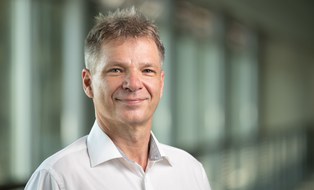
Dean of Studies Traffic Engineering
NameProf. Dr.-Ing. Oliver Michler
Send encrypted email via the SecureMail portal (for TUD external users only).

